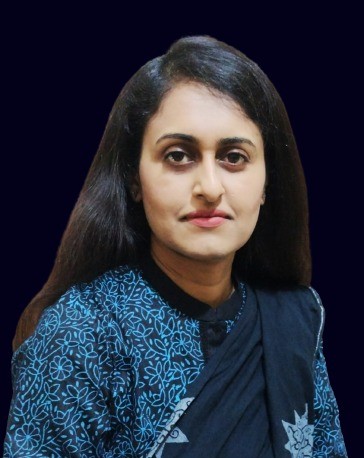

Ms. Tasnim Ferdous
Senior Lecturer
tasnim.ferdous@bracu.ac.bd
Address
CSE Department
4th floor, Room No # 4K73,
Brac University,
Kha 224 Bir Uttam Rafiqul Islam Avenue,
Merul Badda, Dhaka, Bangladesh
Tasnim Ferdous is a Senior Lecturer at BRAC University. She earned her Masters in Electrical and Computer Engineering from Oregon State University (2016), receiving the Laurel Award for Outstanding Academic Performance, and her B.Sc. in Electrical and Electronic Engineering from AIUB (2012).
Her research combines biomedical signal processing, machine learning, and computational neuroscience. She focuses on non-invasive neurotechnology to improve cognitive performance and mental well-being. Her current work includes EEG-based neurofeedback for memory consolidation and automated sleep stage classification using adaptive deep learning models.
Tasnim previously worked as an Electrical Engineer at Electro Scientific Industries (ESI), USA) and as a faculty member at Northern University Bangladesh. She now mentors students and leads initiatives to advance neurofeedback, BCI, and sleep research at BRAC University.
Beside working, she loves to sketch and frame beautiful sights on paper. She also spends time reading on various topics, hiking within the woods and trying out different recipes.
Google Scholar
ORCID
I am looking for motivated undergraduate or master’s students to join my research on AI, Neuroscience, and Computer Vision.
Project-1: Brain-Computer Interface (BCI) Gamified Neurofeedback (Ongoing)
EEG-based neurofeedback for attention & memory.
Skills: Python, deep learning, real-time signal processing, game dev.
Project-2: Driver Drowsiness Detection (Upcoming)
Vision-based drowsiness detection using CNN attention.
Skills: Python, OpenCV, MediaPipe, deep learning.
Send your CV + project interest to: tasnim.ferdous@bracu.ac.bd
Brain Computer Interface based gamified neurofeedback (ONGOING)
This study integrates Brain-Computer Interface (BCI) technology to enhance attention, memory, and manage fatigue-induced drowsiness. It combines Beta-to-(Alpha+Theta) Ratio and Frontal Midline Theta (FM-theta) neurofeedback with eye tracking to stimulate brain activity associated with cognitive performance. A gamified platform provides real-time EEG feedback, while advanced neural networks classify mental states for effective cognitive enhancement.
-Team members: Ms. Tasnim Ferdous, Dr. Aniqua Nusrat Zereen, TBA
Deep learning on EEG based automated Sleep stage classification (ONGOING)
This project focuses on creating a deep learning model that uses EEG signals to classify sleep stages accurately. The model will be trained on data from both healthy people and those with mild sleep problems, aiming to detect abnormal Critical Arousal Periods (CAP) linked to sleep disorders. It will use techniques like PCA for feature reduction and attention-based CNNs, along with Explainable AI (XAI), to highlight the most important features. The model will also be adapted for smartwatches, allowing real-time, home-based sleep tracking for both healthy individuals and those with sleep issues.
-Team members: Ms. Tasnim Ferdous, Dr. Aniqua Nusrat Zereen, Naveed Mahmood
EMG-Based Adaptive Mobile Interaction System for Visually Impaired Users: Gesture Recognition and AI-Driven Control (ONGOING)
An EMG-based adaptive mobile interaction system for visually impaired users to control devices using muscle gestures. Wearable EMG sensors detect gestures, providing haptic and audio feedback. An AI-driven model enhances real-time intent recognition. The project includes a wearable prototype, gesture recognition software, and user trials. It aims to improve accessibility, reduce reliance on voice assistants, and enable independent device control. Challenges include EMG signal noise and user variability, while opportunities arise from the growing demand for assistive tech.
-Team members: Ms. Tasnim Ferdous, MD. Rezaur Rahman Bhuyan, Al Hossain Shawn, Dr. Khalilur Rahman.
Machine learning on PPG based automated Sleep stage classification (Completed)
-Team members: Ms. Tasnim Ferdous, Dr. Aniqua Nusrat Zereen, Reshad Ul Karim, Abrar Samin, Sammam Mahdi, Himika Tasnim
Accepting
As: |
Supervisor |
Level: |
Undergraduate & Postgraduate |
Type: |
|